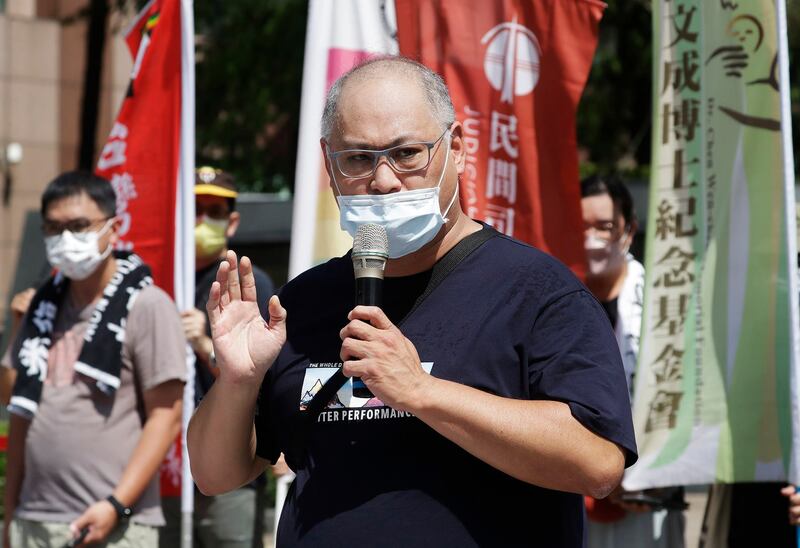Hundreds of protesters took to the streets of democratic Taiwan on Friday in a warning over Beijing's authoritarian ambitions and territorial claims on Taiwan, ahead of China's Oct. 1 National Day holiday.
Activists from more than 20 Taiwanese rights groups stood outside the Bank of China branch in Taipei with banners that read: "Don't give up on human rights!" and "Resist China! Resist authoritarianism!"
In a reference to the Chinese Communist Party (CCP) leader Xi Jinping's call for a "self-confident" China, rights activist Lee Ming-Cheh, who was released from a five-year jail term in China after being found guilty of "subversion of state power," said the CCP is likely one of the least confident governments in the world.
"In my opinion, the Chinese communist government is the least confident government in the world, and can't even tolerate true-to-life movies," Lee told the rally, in a reference to recent movie bans ahead of the CCP's 20th National Congress on Oct. 16.
Taiwan has never been ruled by the CCP, nor formed part of the People's Republic of China, yet Beijing insists that the island is part of its territory and has threatened to annex it by force, if necessary.
Taiwanese president Tsai Ing-wen has said the island's 23 million people have no wish to give up their sovereignty or democratic way of life, a view that has been strongly supported by repeated public opinion polls and her landslide election victory in recent years.
"Taiwan didn't choose the road of confrontation with China," Lee told the rally. "We didn't want to provoke China, but all of the threats to peace in the Taiwan Strait are coming from the Chinese government."
"All we want is to hold onto our values and our way of life," he said. "We are a great country that listens to its people, and doesn't want to be a slave to China."
The protesters called on Taiwanese to keep on defending human rights, to stand up for the island's freedoms, and to actively unite against China's authoritarian ambitions.

'Unite and resist'
Shih Yi-hsiang, head of the Taiwan Association for Human Rights, said respect for human rights is one of the most striking differences between the island and China.
"The need to protect our human rights is our most powerful argument for protecting Taiwan from the threat posed by China," Shih told protesters.
"I don't fear that we won't have enough weapons: what I fear the most is that Taiwan, if we're not careful, could fall back into more conservative values and authoritarianism," he said.
"In the face of the Chinese regime, which is an anti-human rights behemoth, Taiwan needs to make more strategic connections and cooperate with human rights defenders from all over the world to unite and resist," Shih said.
"We must oppose all kinds of authoritarian expansionist moves, whether they are instigated or influenced by China. The defense of human rights is our most powerful weapon in the fight against China," he said.
Sky Fung, secretary-general of the exile group Hong Kong Outlanders, said Hong Kong and Taiwan are now on the front line of resistance against the CCP's brand of authoritarian rule.
"This isn't just a problem for the people of Hong Kong, but something that Taiwanese need to face up to as well," Fung told the rally.
"Since we can't avoid this, we had better endure it together," he said.
Translated and edited by Luisetta Mudie.
